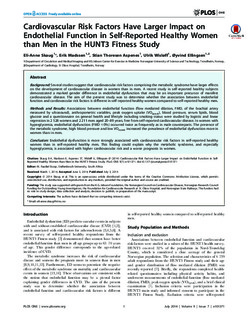| dc.contributor.author | Skaug, Eli-Anne | |
| dc.contributor.author | Madssen, Erik | |
| dc.contributor.author | Aspenes, Stian Thoresen | |
| dc.contributor.author | Wisløff, Ulrik | |
| dc.contributor.author | Ellingsen, Øyvind | |
| dc.date.accessioned | 2015-11-24T09:31:25Z | |
| dc.date.accessioned | 2015-12-09T11:55:36Z | |
| dc.date.available | 2015-11-24T09:31:25Z | |
| dc.date.available | 2015-12-09T11:55:36Z | |
| dc.date.issued | 2014 | |
| dc.identifier.citation | PLoS ONE 2014, 9(7) | nb_NO |
| dc.identifier.issn | 1932-6203 | |
| dc.identifier.uri | http://hdl.handle.net/11250/2367359 | |
| dc.description.abstract | Background:
Several studies suggest that cardiovascular risk factors comprising the metabolic syndrome have larger effects on the development of cardiovascular disease in women than in men. A recent study in self-reported healthy subjects demonstrated a marked gender difference in endothelial dysfunction that may be an important precursor of manifest cardiovascular disease. The aim of the present study was to determine whether the association between endothelial function and cardiovascular risk factors is different in self-reported healthy women compared to self-reported healthy men.
Methods and Results:
Associations between endothelial function (flow mediated dilation, FMD, of the brachial artery measured by ultrasound), anthropometric variables, peak oxygen uptake (VO2peak), blood pressure, serum lipids, blood glucose and a questionnaire on general health and lifestyle including smoking status were studied by logistic and linear regression in 2 528 women and 2 211 men aged 20–89 years, free from self-reported cardiovascular disease. In women with hyperglycemia, endothelial dysfunction (FMD ≤0%) occurred twice as frequently as in male counterparts. The presence of the metabolic syndrome, high blood pressure and low VO2peak increased the prevalence of endothelial dysfunction more in women than in men.
Conclusion:
Endothelial dysfunction is more strongly associated with cardiovascular risk factors in self-reported healthy women than in self-reported healthy men. This finding could explain why the metabolic syndrome, and especially hyperglycemia, is associated with higher cardiovascular risk and a worse prognosis in women. | nb_NO |
| dc.language.iso | eng | nb_NO |
| dc.publisher | Public Library of Science | nb_NO |
| dc.title | Cardiovascular risk factors have larger impact on endothelial function in self-reported healthy women than men in the HUNT3 fitness study | nb_NO |
| dc.type | Journal article | nb_NO |
| dc.type | Peer reviewed | en_GB |
| dc.date.updated | 2015-11-24T09:31:25Z | |
| dc.source.volume | 9 | nb_NO |
| dc.source.journal | PLoS ONE | nb_NO |
| dc.source.issue | 7 | nb_NO |
| dc.identifier.doi | 10.1371/journal.pone.0101371 | |
| dc.identifier.cristin | 1162787 | |
| dc.description.localcode | © 2014 Skaug et al. This is an open-access article distributed under the terms of the Creative Commons Attribution License, which permits unrestricted use, distribution, and reproduction in any medium, provided the original author and source are credited. | nb_NO |
